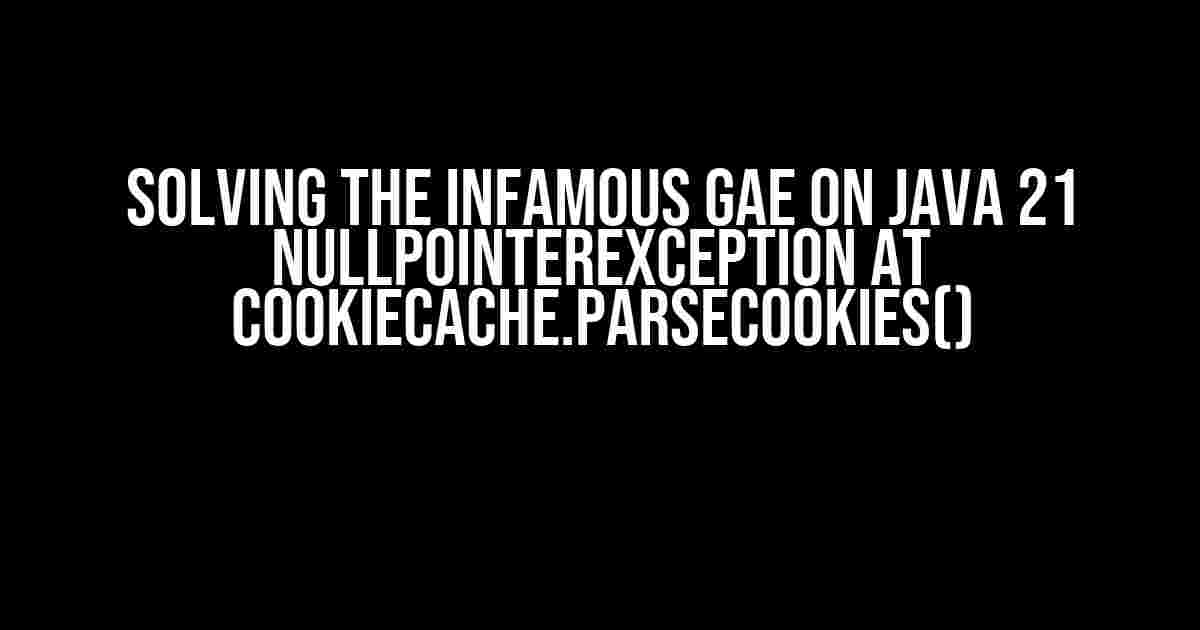If you’re reading this, chances are you’ve stumbled upon one of the most frustrating errors in the world of Google App Engine (GAE) on Java 21: the dreaded NullPointerException at CookieCache.parseCookies().
The Problem: A Brief Overview
The CookieCache.parseCookies() method is responsible for parsing HTTP cookies sent by clients to your GAE application. However, when using Java 21, this method can throw a NullPointerException, bringing your application to a grinding halt. But fear not, dear developer! We’re about to dive into the solution.
Why Does This Error Occur?
The root cause of this error lies in the way Java 21 handles HTTP cookies. In earlier versions of Java, the CookieCache class used to parse cookies using the java.net.HttpCookie class. However, with Java 21, the java.net.HttpCookie class has been deprecated, and the CookieCache class was not updated to accommodate this change.
The Solution: A Step-by-Step Guide
Don’t worry; solving this issue is easier than you think. Follow these steps, and you’ll be back to developing your GAE application in no time:
-
Update your GAE SDK: Make sure you’re using the latest GAE SDK for Java 21. You can check for updates by running the following command:
gcloud components update -
Implement a custom CookieCache: Create a new class that extends the CookieCache class and overrides the parseCookies() method. Here’s an example implementation:
<code> import java.util.List; import java.util.Map; public class CustomCookieCache extends com.google.appengine.api.utils.CookieCache { @Override public Map<String, List<String>> parseCookies(String cookieHeader) { Map<String, List<String>> cookies = new LinkedHashMap<>(); if (cookieHeader != null) { String[] cookieParts = cookieHeader.split("; "); for (String cookiePart : cookieParts) { int equalsIndex = cookiePart.indexOf("="); if (equalsIndex != -1) { String cookieName = cookiePart.substring(0, equalsIndex); String cookieValue = cookiePart.substring(equalsIndex + 1); cookies.put(cookieName, Arrays.asList(cookieValue)); } } } return cookies; } } </code> -
Register your custom CookieCache: Update your GAE application’s configuration to use your custom CookieCache class. You can do this by adding the following code to your
appengine-web.xmlfile:<code> <appengine-web-app xmlns="http://appengine.google.com/ns/1.0"> ... <cookie-cache-class>your.package.CustomCookieCache</cookie-cache-class> ... </appengine-web-app> </code>
Troubleshooting Tips
If you’re still experiencing issues, here are some troubleshooting tips to keep in mind:
-
Check your GAE SDK version: Ensure you’re using the latest GAE SDK for Java 21. You can check your SDK version by running the following command:
gcloud components list -
Verify your custom CookieCache implementation: Double-check that your custom CookieCache class is correctly implemented and registered in your
appengine-web.xmlfile. -
Review your HTTP cookies: Make sure your HTTP cookies are properly formatted and sent to your GAE application.
Conclusion
The NullPointerException at CookieCache.parseCookies() issue can be a real showstopper, but with this solution, you should be able to get your GAE application up and running in no time. Remember to update your GAE SDK, implement a custom CookieCache, and register it in your appengine-web.xml file. Happy coding!
| Java Version | GAE SDK Version | Solution |
|---|---|---|
| Java 21 | Latest | Implement custom CookieCache and register in appengine-web.xml |
If you have any questions or need further assistance, feel free to ask in the comments below!
Remember to bookmark this article and share it with your fellow developers to help them overcome this frustrating error.
Frequently Asked Question
Are you tired of encountering NullPointerException at CookieCache.parseCookies() when using GAE on Java 21? Worry no more! We’ve got the answers to your burning questions.
Question 1: What causes the NullPointerException at CookieCache.parseCookies()?
The NullPointerException typically occurs when the CookieCache.parseCookies() method is called on a null or empty HTTP request cookie header. This can happen when the GAE instance is not properly configured or when there’s an issue with the request headers.
Question 2: How can I troubleshoot the NullPointerException at CookieCache.parseCookies()?
To troubleshoot the issue, review your GAE instance configuration and check the HTTP request headers to ensure they are properly set. Enable debug logging to get more insights into the error. You can also try to simulate the request using a tool like Postman or cURL to isolate the issue.
Question 3: Is the NullPointerException at CookieCache.parseCookies() a bug in GAE or Java 21?
The NullPointerException at CookieCache.parseCookies() is not a bug in GAE or Java 21, but rather a configuration or request header issue. However, it’s essential to ensure you’re using the latest version of GAE and Java 21 to avoid any known issues.
Question 4: Can I catch and handle the NullPointerException at CookieCache.parseCookies()?
Yes, you can catch and handle the NullPointerException using a try-catch block. However, it’s recommended to fix the root cause of the issue rather than just catching the exception. Properly handling the exception can help prevent application crashes, but it’s not a substitute for resolving the underlying problem.
Question 5: Are there any workarounds or alternative solutions to the NullPointerException at CookieCache.parseCookies()?
If you’re experiencing issues with CookieCache.parseCookies(), consider using an alternative cookie parsing library or implementing a custom cookie parsing mechanism. Additionally, review your application’s cookie handling logic to ensure it’s robust and can handle edge cases.
